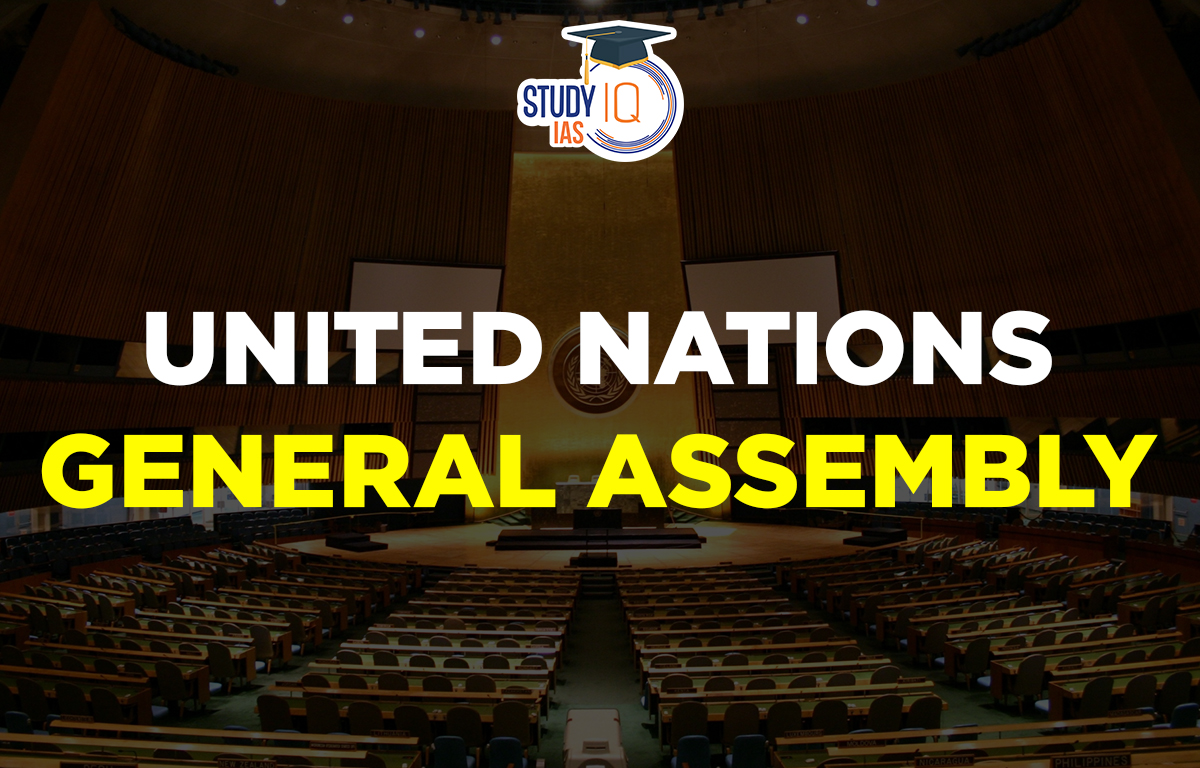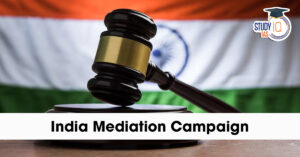Table of Contents
United Nations General Assembly
The General Assembly of the United Nations (UNGA) is one of the United Nation’s six main bodies. Given that it serves as the primary decision-making and representative body of the UN, the UNGA is a crucial subject for the IAS examination.
United Nations General Assembly (UNGA)
One of the main bodies of the UN is the United Nations General Assembly (UNGA). The United Nations General Assembly (UNGA), the UN’s chief policy-making and representative organ, was established in 1945. Every year, it meets from September to December, and then again between January and August. The headquarters of UNGA is located in New York.
The Assembly holds its main meeting— the general debate — at the start of each regular session in September, where representatives from each member state are given the opportunity to raise any issues that concern them. It is one of the United Nations’ six primary organs (UN).
President of United Nations General Assembly
Csaba Kőrösi is the incumbent President of the United Nations General Assembly since 13 September 2022. The United Nations General Assembly (UNGA) elects a president each year from among its members.
United Nations General Assembly Functions
It is the UN’s main deliberative, policymaking, and representative organ. It serves as the organization’s primary governing body and is the UN body with the greatest degree of representativeness. The UNGA, also known as just the GA, is attended by representatives of every UN member. It, therefore, has 193 members (all the UN member countries).
It holds yearly meetings in its headquarters in New York City, usually in September. Depending on the situation, it may also convene at other times. The President of the UNGA is in charge and is chosen for a one-year term. It is sometimes referred to as the global parliament.
Important Issues like peace and security and other global concerns are discussed and decided by the UNGA. It also makes decisions about membership expansion. Voting is used to make decisions. In most cases, a simple majority is taken into account, but in cases of significant decisions, a two-thirds majority is taken into account. Each participant has one vote. There is no one with veto power, unlike the Security Council. Vijaya Lakshmi Pandit, the only Indian General Assembly President to date, was elected as the UNGA’s eighth president in 1953.
United Nations General Assembly Purpose
The following lists the United Nations General Assembly’s duties and authority:
- Consideration and approval of the UN budget, as well as the establishment of member countries’ financial assessments.
- Examining and recommending general principles of cooperation to maintain global peace and security, including disarmament.
- Electing non-permanent members of the United Nations Security Council (UNSC) and members of other UN councils and organs, as well as appointing the Secretary-General in accordance with UNSC recommendations.
- Discussing international peace and security issues and making recommendations (unless the matter is currently being discussed by the Security Council).
- Developing and codifying international law, achieving fundamental freedoms and human rights, and fostering international cooperation in the social, economic, humanitarian, educational, cultural, and health domains. Initiating studies and making recommendations to improve international political cooperation.
- Making suggestions for the peaceful resolution of any dispute that threatens international harmony.
- Reports from the UNSC and other UN bodies are also taken into consideration by the UNGA.
- When there are risks to peace and the UNSC has not taken action as a result of a permanent member’s veto, the GA may take the situation under consideration and make recommendations to its members.
UNGA Subsidiary Organs
The UNGA is supported by a large number of subsidiary organizations, including commissions, committees, boards, councils, and working groups. The UNGA’s commissions are:
- Disarmament Commission
- International Law Commission
- International Civil Service Commission
- United Nations Peacebuilding Commission
- United Nations Conciliation Commission for Palestine
- United Nations Commission on International Trade Law (UNCITRAL)
United Nations General Assembly 77th Meeting
The 77th session of the United Nations General Assembly (UNGA 77) began on September 13, 2022. The high-level General Debate began on September 20, 2022, in UNGA New York. The theme of the 77th session was “A watershed moment: transformative solutions to interlocking challenges,” which stems from the realisation that the world is at a tipping point due to “complex and interconnected crises,” according to the UN. “The General Assembly is convening at a critical juncture,” UN Secretary-General António Guterres has stated “Our world is marred by war, battered by climate chaos, scarred by hatred, and sullied by poverty, hunger, and inequality.”
The Assembly meetings are also taking place in the aftermath of a heightened climate crisis that has resulted in deadly floods in Pakistan, killing thousands and displacing millions, as well as severe droughts in parts of Europe and China. The conflict between the two nations, which has lasted seven months since Russia invaded Ukraine, is likely to take up most of the conversation. Geopolitical differences are at their “widest since the Cold War,” according to Guterres.
Russia and Ukraine are both major exporters of grains and fertilisers, and the UN has stated that the war has made the pandemic and climate change-related food scarcity situation worse.
India was one of the 101 nations that voted on September 17 in favour of enabling Volodymyr Zelenskyy, the president of Ukraine, to address delegates at the General Debate via a pre-recorded speech. Zelenskyy hasn’t left his country since the start of the war. The 2015 nuclear agreement with Iran is not anticipated to be discussed during the 77th session.
United Nations General Assembly India
The UN General Assembly session was not attended by Prime Minister Modi which was held in September 2022. The nation’s official envoy at the event was Foreign Affairs Minister S Jaishankar. India primarily focused on counterterrorism, peacekeeping, reformed multilateralism, climate action, and equitable access to COVID-19 vaccinations during the high-level UN General Assembly session. India’s approach to the UNGA is”guided” by the five S’s:
- Samman (Respect),
- Samvad (Dialogue),
- Sahyog (Cooperation),
- Shanti (Peace), and
- Samriddhi (Prosperity), as outlined by Prime Minister Narendra Modi.


 US Pulls Funding from GAVI-Global Vaccin...
US Pulls Funding from GAVI-Global Vaccin...
 India Mediation Campaign, Objectives, Pr...
India Mediation Campaign, Objectives, Pr...
 International Potato Center (CIP) in Agr...
International Potato Center (CIP) in Agr...





















